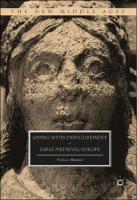Living with Disfigurement in Early Medieval Europe
Abstract
This book is open access under a CC-BY 4.0 license. This book examines social and medical responses to the disfigured face in early medieval Europe, arguing that the study of head and facial injuries can offer a new contribution to the history of early medieval medicine and culture, as well as exploring the language of violence and social interactions. Despite the prevalence of warfare and conflict in early medieval society, and a veritable industry of medieval historians studying it, there has in fact been very little attention paid to the subject of head wounds and facial damage in the course of war and/or punitive justice. The impact of acquired disfigurement —for the individual, and for her or his family and community—is barely registered, and only recently has there been any attempt to explore the question of how damaged tissue and bone might be treated medically or surgically. In the wake of new work on disability and the emotions in the medieval period, this study documents how acquired disfigurement is recorded across different geographical and chronological contexts in the period.
Keywords
Medieval Literature; Medieval Philosophy; History of Medieval Europe; Disfigurement; Gender; Medicine and health; Violence; Literary studies: ancient, classical & medieval; European history: medieval period, middle agesDOI
10.1057/978-1-137-54439-1Publisher
Springer NaturePublisher website
https://www.springernature.com/gp/products/booksPublication date and place
2017Imprint
Springer International PublishingClassification
Literary studies: ancient, classical and medieval
Medieval Western philosophy
European history


 Download
Download Web Shop
Web Shop